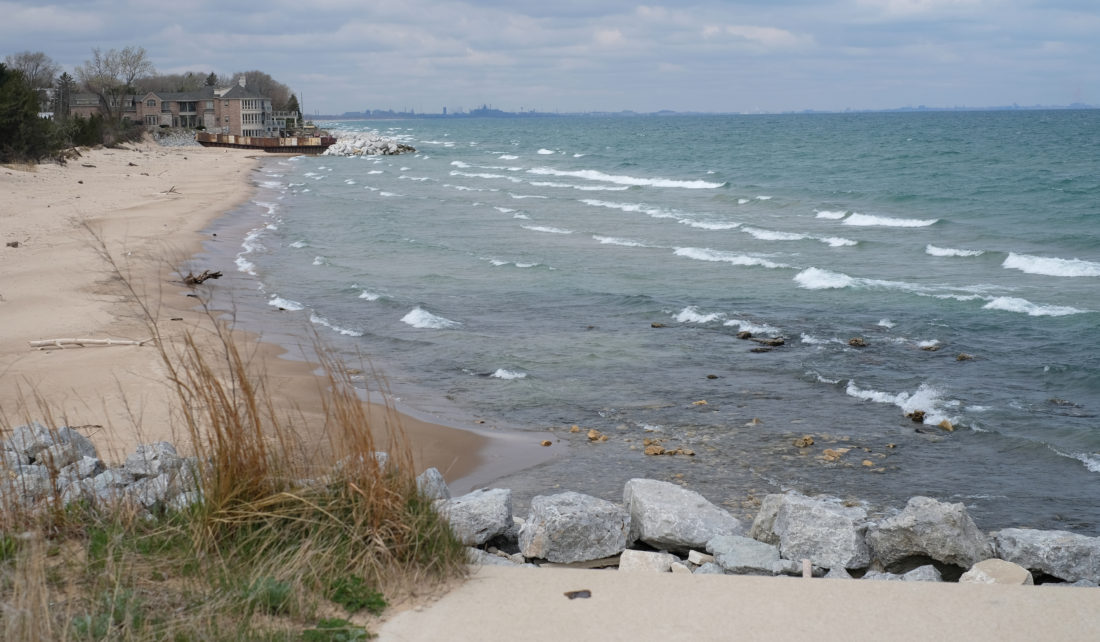
Illinois-Indiana Sea Grant (IISG) will award $892,000 to 14 research projects in 2022. Five projects are already underway and will inform decision making for some of the region’s pressing coastal issues, including protecting shorelines, improving aquaculture, and preventing drownings. Several projects will recruit youth to engage in research, opening up opportunities and potentially inspiring tomorrow’s scientists.
This summer, nine more projects will form the latest cohort of the IISG Faculty and Graduate Student Scholars Program, which, through one year of funding, helps develop a community of scientists to research critical issues related to Lake Michigan and the Great Lakes region.
The five 2-year research projects in progress will support and expand IISG efforts in key areas.
- Robin Mattheus of the Illinois State Geological Survey will engage in research to support coastal resilience. This team will build on previous work with the Chicago Park District and the Illinois Coastal Management Program, specifically studying how the lake bottom near Chicago affects movement of sand and sediment, and how that impacts shorelines.
- Paul Brown and Yu-Ting Chu of Purdue University will study the potential for expanding marine aquaponics in the Midwest. Aquaponics is a circular system for growing plants and fish simultaneously. The team will identify possible salt-tolerant plant species, explore marine aquaponic systems, and quantify the demand for marine aquaponic products in Chicago markets.
- Michelle Macy of the Ann & Robert H. Lurie Children’s Hospital of Chicago will lead a team focused on decreasing drownings at Lake Michigan beaches. They will assess the impact of the Chicago Park District’s community water safety training and develop a swimming instruction program in Evanston, Illinois that will be adapted for implementation in other Chicago communities.
- Brian Murphy of the University of Illinois Chicago and Will Edmonson at the James R. Jordan Boys & Girls Club of Chicago will directly involve students in Great Lakes-based antibiotic discovery research. Students will help collect samples from the Chicago River and Lake Michigan. Plus, they will learn how to use robotics to build a bacteria library and to test their samples against human pathogens.
- Nadine Folino-Rorem of Wheaton College will lead a team of community scientists and students as they investigate invasive freshwater jellyfish blooms in Lake Michigan to get some insight into how the organisms may respond to climate change.
The 2022 group of IISG Faculty Scholars includes Jessica Ward of Ball State University, who will study the effect of microplastics and contaminants on larval fish and Lopamudra Chakraborti from Loyola University Chicago, who will conduct economic analyses on tourism in response to the cleanup of the Waukegan Area of Concern. In addition, Eleftheria Kontou at the University of Illinois at Urbana-Champaign and Chengcheng Tao of Purdue University will use modeling to explore improving the resiliency of southern Lake Michigan communities to flooding.
Five new IISG Graduate Student Scholars from University of Illinois Chicago, Northwestern University, Loyola University Chicago, Ball State University, and Purdue University will improve their research in the areas of antibiotics, thermal pollution in the Chicago River, economic benefits of water quality improvements in Great Lakes Areas of Concern, and fish health, specifically alewife and lake sturgeon. Their projects and stories will be featured in the IISG newsroom and on social media channels throughout 2022 and 2023.
“We are so excited to support these research projects,” said Carolyn Foley, IISG research coordinator. “They cover a broad set of issues in support of the Lake Michigan communities we serve, including introducing younger students to scientific research, and we cannot wait to see the outcomes.”
The full set of research projects supported through IISG’s competitive process can be explored through our Research Project Database: https://iiseagrant.org/research/research-projects/.
Illinois-Indiana Sea Grant is a part of University of Illinois Extension and Purdue Extension.
Contact: Carolyn Foley

